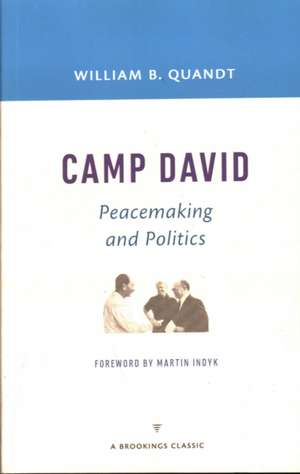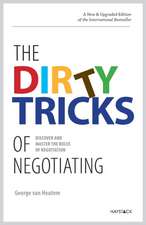Camp David: Peacemaking and Politics: A Brookings Classic
Autor William B. Quandten Limba Engleză Paperback – 5 ian 2016
Preț: 241.14 lei
Nou
Puncte Express: 362
Preț estimativ în valută:
46.15€ • 50.11$ • 38.76£
46.15€ • 50.11$ • 38.76£
Carte tipărită la comandă
Livrare economică 23 aprilie-07 mai
Preluare comenzi: 021 569.72.76
Specificații
ISBN-13: 9780815726753
ISBN-10: 0815726759
Pagini: 538
Ilustrații: black & white illustrations
Dimensiuni: 140 x 216 x 29 mm
Greutate: 0.64 kg
Ediția:With a New Fore
Editura: Brookings Institution Press
Colecția Brookings Institution Press
Seria A Brookings Classic
ISBN-10: 0815726759
Pagini: 538
Ilustrații: black & white illustrations
Dimensiuni: 140 x 216 x 29 mm
Greutate: 0.64 kg
Ediția:With a New Fore
Editura: Brookings Institution Press
Colecția Brookings Institution Press
Seria A Brookings Classic
Notă biografică
William B. Quandt is an American scholar, author, and professor emeritus at the University of Virginia and former senior fellow in Foreign Policy at the Brookings Institution. During the Nixon and Carter administrations, he served on the staff of the National Security Council and was deeply involved in the first Camp David negotiations.
Textul de pe ultima copertă
In September 1978 William Quandt, a member of the White House National Security Council staff, spent thirteen momentous days at Camp David, the presidential retreat in Maryland, where three world leaders were holding secret negotiations. When U.S. President Jimmy Carter, Egyptian President Anwar Sadat, and Israeli Prime Minister Menachem Begin emerged from their talks, they announced a signal accomplishment: the first peace agreement between Israel and one of its Arab neighbors, Sadat’s Egypt.
Quandt, drawing on what he saw and heard during the talks and on official documents, wrote Camp David in order to show how presidents negotiate difficult issues. His book has become, with time, a scholarly classic and, as Martin Indyk notes in his foreword, “a model of critical, in-depth, fact-based, policy-relevant research.”
Quandt’s book is not only an eyewitness account but also a scholar’s reconstruction of a milestone event in Middle East diplomacy, with insights into the people, politics, and policies. His Camp David has provided a comprehensive and lasting guide to the difficult negotiations surrounding the talks, including the fraught scenario leading up to the meetings at the presidential retreat and the talks and accord that would lead to Sadat and Begin jointly receiving the 1978 Nobel Peace Prize.
Quandt, drawing on what he saw and heard during the talks and on official documents, wrote Camp David in order to show how presidents negotiate difficult issues. His book has become, with time, a scholarly classic and, as Martin Indyk notes in his foreword, “a model of critical, in-depth, fact-based, policy-relevant research.”
Quandt’s book is not only an eyewitness account but also a scholar’s reconstruction of a milestone event in Middle East diplomacy, with insights into the people, politics, and policies. His Camp David has provided a comprehensive and lasting guide to the difficult negotiations surrounding the talks, including the fraught scenario leading up to the meetings at the presidential retreat and the talks and accord that would lead to Sadat and Begin jointly receiving the 1978 Nobel Peace Prize.
Descriere
In September 1978, William Quandt, a member of the White House National Security Council staff, spent thirteen momentous days at Camp David, the presidential retreat in Maryland, where three world leaders were holding secret negotiations. When U.S. President Jimmy Carter, Egyptian President Anwar Sadat, and Israeli Prime Minister Menachem Begin emerged on September 17, they announced a monumental accomplishment: the first peace agreement between Israel and one of its Arab neighbors.
Praised by some for laying the foundations for peace between Egypt and Israel, the accords have also been criticized for failing to achieve a comprehensive settlement, including a resolution of the Palestinian question. But supporters and critics alike recognize the importance of what happened at Camp David, and both groups acknowledge the vital role played by the United States in reaching an agreement.
There are few eyewitness accounts of the Camp David negotiations. Of the three leaders present, only Jimmy Carter wrote specifically of the talks in Keeping Faith: Memoirs of a President (1982). Neither Sadat nor Begin ever wrote about Camp David.
Quandt's book is not only an eyewitness account but a scholar's reconstruction of the event, with insights into the people, politics, and policies. His Camp David has provided a comprehensive and lasting guide to the difficult negotiations surrounding the talks, including the fraught scenario leading up to the meetings at the presidential retreat and the accord that would lead to Sadat and Begin jointly receiving the 1978 Nobel Peace Prize.
Praise for Camp David: Peacemaking and Politics "The most authoritative account of a major historic event, written with scrupulous scholarship by a key behind-the-scenes participant." —Zbigniew Brzezinski, Adviser to the President for National Security Affairs, 1977–81
"An excellent piece of work... will represent a major contribution to the academic literature on American Middle East policy during the Carter administration. No one but Bill Quandt could, in my view, write so knowledgeable, yet so judiciously balanced, an account." —Hermann Frederick Eilts, Director, Boston University Center for International Relations, and ambassador to Egypt, 1973–79
"Quandt writes as a participant in the process and as a thoughtful, proven scholar, an expert on international diplomacy and on the Middle East." — Foreign Affairs
Praised by some for laying the foundations for peace between Egypt and Israel, the accords have also been criticized for failing to achieve a comprehensive settlement, including a resolution of the Palestinian question. But supporters and critics alike recognize the importance of what happened at Camp David, and both groups acknowledge the vital role played by the United States in reaching an agreement.
There are few eyewitness accounts of the Camp David negotiations. Of the three leaders present, only Jimmy Carter wrote specifically of the talks in Keeping Faith: Memoirs of a President (1982). Neither Sadat nor Begin ever wrote about Camp David.
Quandt's book is not only an eyewitness account but a scholar's reconstruction of the event, with insights into the people, politics, and policies. His Camp David has provided a comprehensive and lasting guide to the difficult negotiations surrounding the talks, including the fraught scenario leading up to the meetings at the presidential retreat and the accord that would lead to Sadat and Begin jointly receiving the 1978 Nobel Peace Prize.
Praise for Camp David: Peacemaking and Politics "The most authoritative account of a major historic event, written with scrupulous scholarship by a key behind-the-scenes participant." —Zbigniew Brzezinski, Adviser to the President for National Security Affairs, 1977–81
"An excellent piece of work... will represent a major contribution to the academic literature on American Middle East policy during the Carter administration. No one but Bill Quandt could, in my view, write so knowledgeable, yet so judiciously balanced, an account." —Hermann Frederick Eilts, Director, Boston University Center for International Relations, and ambassador to Egypt, 1973–79
"Quandt writes as a participant in the process and as a thoughtful, proven scholar, an expert on international diplomacy and on the Middle East." — Foreign Affairs























